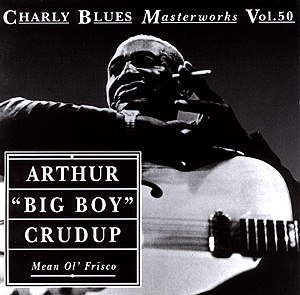|
|
|
01 |
Mean Ol' Frisco |
|
|
|
02:36 |
|
|
02 |
I'm in the mood |
|
|
|
02:21 |
|
|
03 |
That's all right |
|
|
|
02:21 |
|
|
04 |
Standin' at my window |
|
|
|
02:16 |
|
|
05 |
Angel child (Take 1) |
|
|
|
02:48 |
|
|
06 |
Katie Mae |
|
|
|
02:51 |
|
|
07 |
Look at yonder wall |
|
|
|
02:21 |
|
|
08 |
Dig myself a hole |
|
|
|
02:24 |
|
|
09 |
If I get lucky |
|
|
|
02:30 |
|
|
10 |
Death Valley |
|
|
|
02:41 |
|
|
11 |
I love her just the same |
|
|
|
02:12 |
|
|
12 |
Angel child (Take 2) |
|
|
|
05:28 |
|
|
13 |
Rock me mama |
|
|
|
02:27 |
|
|
14 |
Ethel Mae |
|
|
|
02:23 |
|
|
15 |
My mama don't allow me |
|
|
|
02:21 |
|
|
|
| Country |
USA |
| Spars |
DDD |
| Sound |
Stereo |
|
|
|
Arthur Grudup v, g with unknown b; d. Rec: New York City, 1962.
Of course Elvis Presley had his influences - no-one's vocal style comes out of nowhere. Gospel music, blues on the black music stations, country from the Grand Ol' Opry and Louisiana Hayride would all have played their part.
But Presley is as close to an original as popular music has ever come to, and it would be straining credibility to hear any of the seeds of his mould-shattering style in the downhome, loose-limbed, small-combo blues of Arthur "Big Boy" Crudup. And yet Presley picked up on the Crudup catalogue twice in the earliest period of his career, with 'That's All Right" and "My Baby Left Me", and later he recorded "So Glad You're Mine".
"That's All Right" was the song that started it all. Presley had been teamed by Sun boss Sam Phillips with guitarist Scotty Moore and bass-player Bill Black, from country band Doug Poindexter's Starlight Wranglers, and while getting nowhere with ballads one day Presley suddenly went into the Crudup tune. It was the revolutionary recording that began the legend.
It makes sense that Presley was familiar with the Crudup catalogue, since the latter was a popular artist during Presley's childhood in the 1940s, and his records would have leaked over the radio into Elvis's musically-acquisitive consciousness. During this period of his greatest success Crudup was recording for Victor in Chicago, supplementing his strong vocals but somewhat rudimentary guitar with a simple slap beat from the drummer, and on some sessions, a bass line. This is the format he returned to for these 1962 tracks.
Crudup was born in Mississippi in 1905, and eventually fetched up in Chicago around 1940. He had been a performer since childhood, initially in church groups, but had frequently returned to humble jobs outside music. This need continued throughout his life - he never saw much money from music even during his hoy-day, and didn't benefit from the Presley covers because he'd sold the songs for a flat fee. It is rumoured that Presley paid for a late-50s session during which Crudup re-recorded many of his familiar titles (as he does again on this collection), but Crudup the blues catalyst remained in comparative poverty. If Presley did indeed fund a session it suggests a guilty conscience - fair royalties from just three Elvis tracks at the time would have made Crudup a tidy living.
There are reminders of John Lee Hooker in some of Crudup's songs (particularly "I'm in the Mood", which he appropriated from Hooker), and there are more frequent evocations of the Texan blues master Lightnin' Hopkins. But Crudup's greatest strength is in his reworkings of familiar blues themes into simple, memorable tunes and lyric lines - the talent that caused his songs to lodge in the mind of the truck-driver from Tupelo.
In his old age, helped no doubt by the Presley connection but nevertheless justifiably, considering his honourable place in the history of the blues, Crudup received respectful recognition from the wider white audience. In the early 70s he toured the UK, appearing on television and recording. As part of an American blues package he travelled the USA and Australia. A film was made about him in France, he played such prestigious gigs as the Newport Jazz Festival, and in the last year of his life he toured with Bonnie Raitt. In 1974 he died in Virginia, as the result of a stroke.
John Collis
